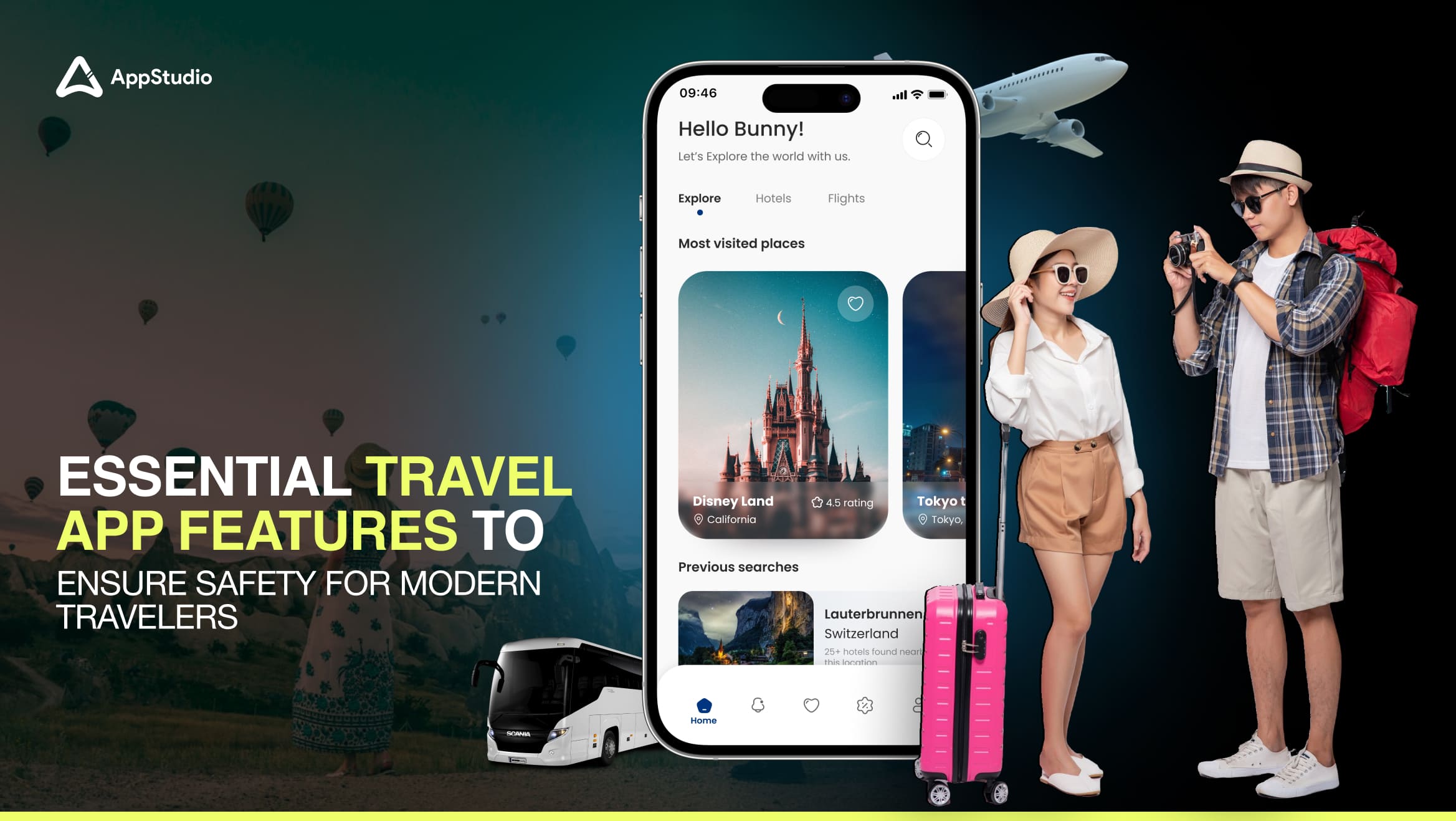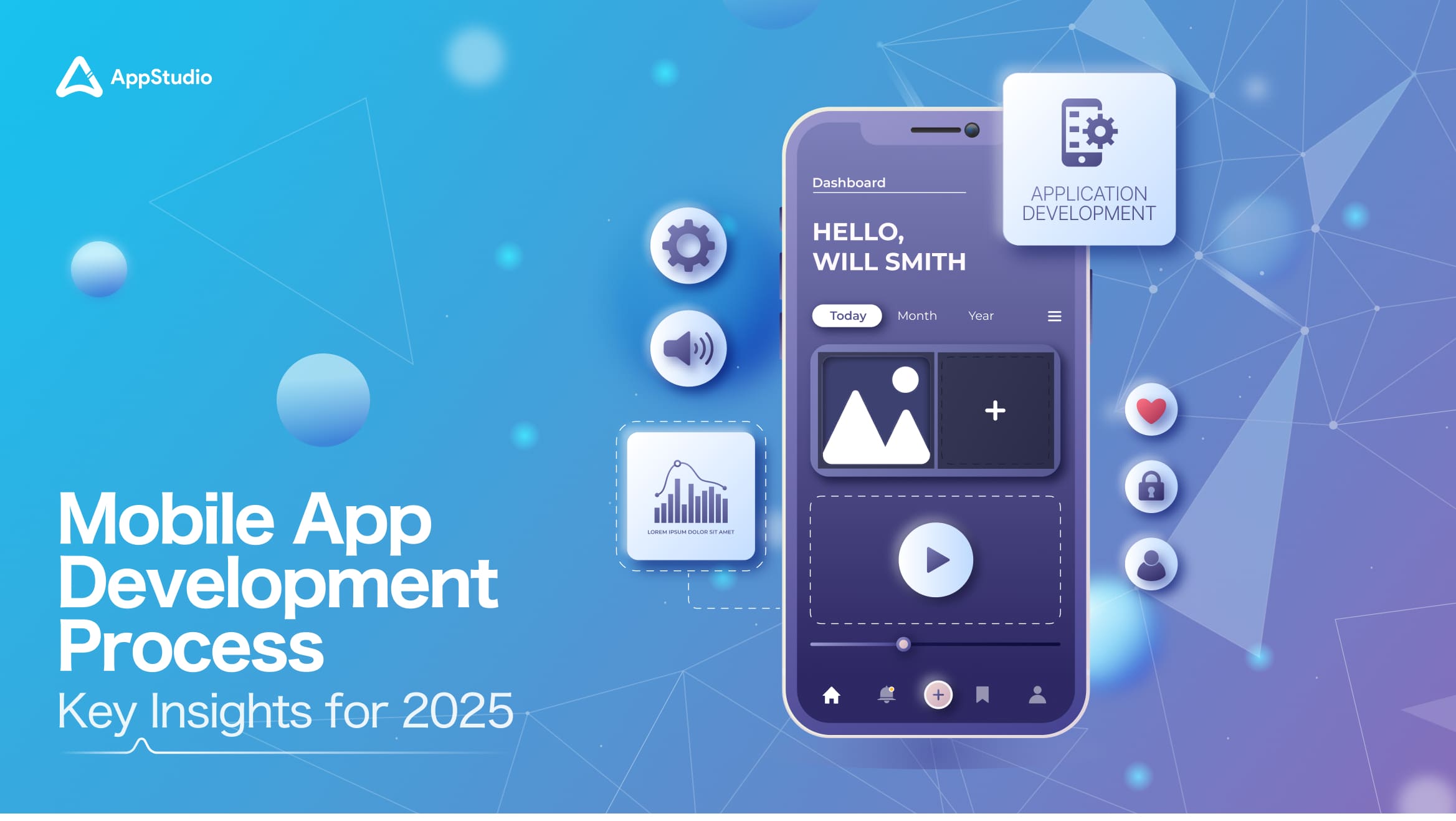Travel has never been more accessible, yet modern travelers’ safety remains a top concern. Navigating unfamiliar places often brings uncertainty, leaving many feeling vulnerable. Recent reports reveal that 37% of travelers experience anxiety about safety and security, underscoring the need for reliable solutions. This growing concern has elevated the role of travel apps—they are no longer just tools of convenience; they have evolved into indispensable safety companions.
Today’s travel booking app features address these challenges head-on. With tools like real-time location tracking, instant emergency assistance, and AI-powered safety alerts, these apps enable travelers to stay informed, connected, and protected. Features like offline maps and community-sourced safety insights further empower users to make wise decisions. In the sections ahead, we’ll explore how these innovations enhance the safety features of travel app and transform traveling into a secure, stress-free experience.
What Makes Safety a Top Concern for Modern Travelers?
How we approach travel has dramatically changed, and safety is now at the forefront for modern explorers—reshaping how trips are planned and experienced. From solo adventurers to families exploring new destinations, the fear of unexpected risks, whether health-related, natural, or security, has become a reality that can’t be ignored. Global uncertainties, shifting travel advisories, and unpredictable local conditions have only amplified these concerns.
For many travelers, the challenge lies in skimming unfamiliar places while preparing for unforeseen events. This growing emphasis on safety is about avoiding risks and ensuring a stress-free and confident travel experience. Whether staying informed about local conditions or having tools to manage emergencies, prioritizing safety has become essential to modern travel.
This is where technology has emerged as a crucial ally, with travel booking app features stepping up to address these challenges. By offering tools such as
- real-time safety alerts
- emergency assistance, and
- smart navigation
…these apps are transforming travel into a more informed and secure experience.
Notably, safety concerns also primarily focus on understanding the factors and challenges that have elevated safety to a fundamental consideration for travelers. This includes:
- Current Global Risks: Rising concerns about geopolitical tensions, natural disasters, and health crises like pandemics.
- Technological Changes: Increased access to real-time updates and safety tools, making travelers more aware of risks.
- Changing Travel Patterns: Growth in solo travel, offbeat destinations, and adventure tourism, which come with unique safety challenges.
- Traveler Awareness: A more informed and cautious travel community that prioritizes safety due to access to online resources and reviews.
- Security Concerns: Cyber threats, theft, and personal safety while traveling domestically or internationally.
Related reading: How Long Does it Take to Develop an App?
What are the Benefits of Travel Apps for Tourism Industry?
Traveling today isn’t just about reaching a destination; it’s about living in the moment, which was once considered gender-segmented. It’s about safety and convenience, especially for solo adventurers, women, and those exploring off-the-beaten-path locations. Travel apps have become indispensable companions, addressing modern travelers’ needs for connectivity, affordability, making reservations, comparing stays and more while accessing the world’s most remote corners. Given the scenario, the many benefits of travel apps for the tourism industry are a must-know.
1. Personalized Travel Planning
Travel apps use Artificial Intelligence to recommend itineraries, accommodations, and activities, making even remote or lesser-known destinations easy to navigate. This saves time and offers cost-effective solutions for curated travel plans.
2. Real-Time Safety Alerts
Travel apps now provide real-time alerts on weather, local conditions, or potential risks, ensuring users can make smart decisions. This added security, paired with the app’s accessibility, reduces the stress of navigating unfamiliar terrain.
3. Offline Accessibility for Remote Locations
Remote destinations often lack reliable internet, but travel apps with offline capabilities solve this problem. From detailed maps to emergency contacts and local information, these apps ensure uninterrupted access to critical data, saving costs on local guides or navigation devices.
4. Community and Support Networks
Travel apps connect explorers to a global community, offering reviews, advice, and local tips from fellow travelers. This is invaluable for solo or female travelers, providing safety and camaraderie while reducing the need for expensive, third-party consultations.
5. Local Mapping Made Simple
Steering through unfamiliar locations is easier with apps featuring AR-based guides and real-time translation tools. These features eliminate language barriers and make exploring remote places intuitive and cost-effective, avoiding the expense of hiring local guides while enhancing the overall travel experience.
9 Top Features of Travel Apps that Enhance Safety & Experience
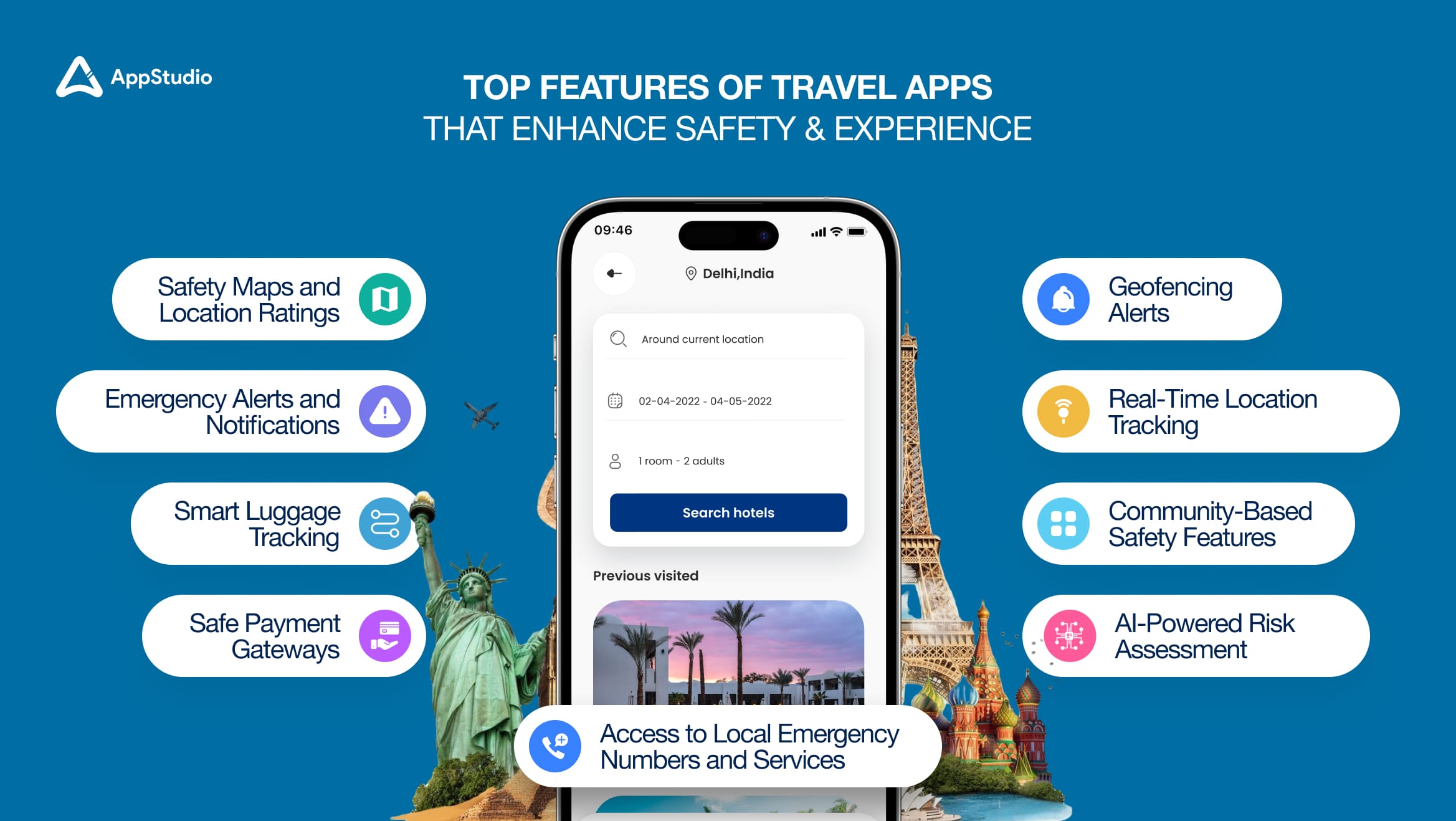
Safety remains at the heart of every travel decision. For modern travelers, ensuring personal security can be challenging, especially when faced with unfamiliar environments or unpredictable circumstances. This is where travel apps have stepped in, offering innovative solutions to address safety concerns.
What was once a tool for booking flights or finding accommodations has evolved into a comprehensive travel companion. Below, we’ll explore essential features of travel app that empower users to travel confidently, transforming their journeys into stress-free adventures.
1. Emergency Alerts and Notifications
What: Travel apps provide timely alerts about safety advisories, natural disasters, or local security incidents. These notifications include updates on severe weather, political unrest, or health risks, helping travelers stay informed in real-time.
Why: Staying aware of immediate risks enables travelers to adapt their plans quickly. Whether avoiding a dangerous area or seeking shelter during adverse weather, real-time alerts significantly reduce the likelihood of encountering harm. This critical travel app feature empowers users to travel smarter and safer.
2. Safety Maps and Location Ratings
What: These maps provide insights into safety levels for specific areas using user reviews, crime data, and local statistics. Travelers can assess destinations before visiting and identify neighborhoods to avoid.
Why: By offering transparency about location safety, travelers can plan smarter routes and accommodations. These travel booking app features proactively reduce risk, ensuring peace of mind while exploring unfamiliar environments.
3. Access to Local Emergency Numbers and Services
What: Some travel mobile app features provide a localized directory of emergency contacts, such as police, medical facilities, and fire departments. These numbers are automatically updated based on the traveler’s current location.
Why: Quick access to emergency services can make a critical difference in urgent situations. Knowing whom to call—and how to reach them—ensures that travelers are prepared to act swiftly during crises, fostering confidence throughout their journey.
4. Real-Time Location Tracking
What: Real-time location tracking lets travelers share their live whereabouts with trusted contacts or family members. Modern apps integrate GPS technology to provide accurate and up-to-the-minute location updates, ensuring that users can always be located. Advanced features allow users to schedule automated location check-ins, set virtual paths, or activate emergency tracking if they sense danger.
Why: This feature provides a critical safety net for solo travelers or those exploring remote destinations. If travelers lose contact or face emergencies, their exact location can be pinpointed instantly for faster assistance. Whether hiking in the mountains, exploring unfamiliar cities, or traveling late at night, real-time tracking significantly reduces safety concerns.
Related reading: What Are the Challenges in Mobile App Development
5. Smart Luggage Tracking
What: Smart luggage tracking integrates GPS-enabled technology with travel apps to allow users to monitor the real-time location of their bags. Many travel offer notifications if luggage strays from its designated path, is delayed during transit, or is mistakenly rerouted. Some advanced tracking features even allow integration with airline systems for quicker recovery and updates.
Why: Each year, 5% of checked-in bags get lost, and 18% are damaged. With real-time tracking, users can follow their bags, ensuring they arrive at the correct destination. Notifications alert travelers immediately, allowing them to take action quickly with airlines or transport services. These features of the travel app eliminate uncertainty and restore control, making travel smoother and less stressful, particularly during long-haul trips with multiple transfers.
6. Community-Based Safety Features
What: Community-driven platforms allow travelers to connect with other users to share valuable safety insights, updates, and first-hand experiences. This travel app feature enables travelers to flag unsafe areas, highlight hidden risks, and recommend safe alternatives based on real-world experiences. Some apps also offer rating systems where users can review neighborhoods, attractions, or accommodations from a safety perspective, fostering a collaborative network of informed travelers.
Why: No one understands travel safety better than those who’ve experienced it first-hand. Whether avoiding a high-crime neighborhood, steering the road conditions, or receiving tips on safe transportation options, this real-time information sharing enhances decision-making. Community-driven safety fosters trust among users and helps travelers feel more confident when exploring new or uncertain destinations.
7. Safe Payment Gateways
What: Most travel mobile app features include secure payment gateways that encrypt financial transactions. Users can confidently book flights, accommodations, and activities without worrying about fraud or data theft.
Why: Online fraud is a growing concern. This feature protects users’ sensitive information, ensuring seamless and secure transactions. Safe payments build trust, encouraging travelers to book services through tourism app features without hesitation.
8. AI-Powered Risk Assessment
What: AI algorithms analyze data from news, weather reports, and social media to detect potential travel risks, including political instability, natural disasters, or local disruptions. Users receive real-time recommendations based on this analysis.
Why: AI-driven risk assessments transform uncertainty into actionable insights. By flagging potential dangers in advance, these tourism app features allow travelers to adjust plans and avoid hazards, making journeys safer and stress-free.
9. Geofencing Alerts
What: Using geofencing technology, travel apps create virtual boundaries for safe or unsafe areas. Travelers receive notifications when they enter or exit these zones, informing them of their surroundings.
Why: Geofencing helps travelers remain vigilant about their location, preventing accidental entry into unsafe areas. This travel app feature ensures users always stay aware of their environment, especially in unfamiliar or high-risk destinations.
How Travel Apps Simplify Journeys and Enhance Experiences?
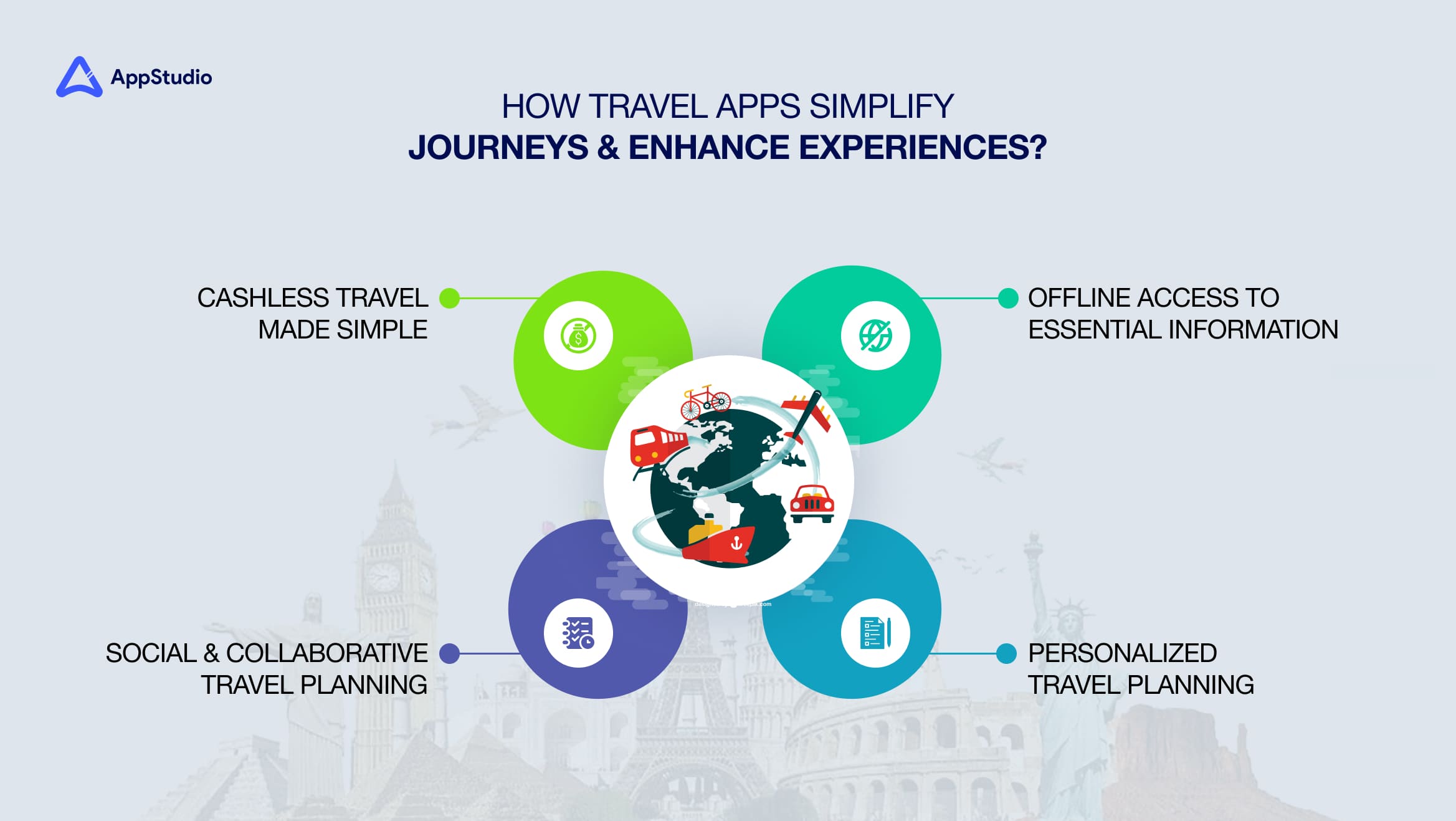
While safety remains the cornerstone of any successful journey, features of tourism app are designed to do much more than just safeguard travelers. Here are some key advantages that make travel apps an essential companion.
1. Cashless Travel Made Simple
By integrating secure digital payment options, travel apps have eliminated the need for physical cash. Whether booking flights, paying for hotels, or purchasing experiences, travelers can make transactions instantly without the hassle of currency exchange or carrying physical money.
2. Personalized Travel Planning
Travel mobile app features have evolved far beyond essential information sharing. They are now harnessing the power of machine learning and big data. Travel apps analyze budgets, preferred travel routes, transportation options, and user preferences. This allows for tailored itineraries and recommendations that align perfectly with individual needs.
3. Social and Collaborative Travel Planning
Travel apps have transformed into collaborative platforms where travelers can share experiences, tips, and safety insights. Reviews, recommendations, and suggestions from friends or fellow tourists offer real-world perspectives that aid decision-making.
4. Offline Access to Essential Information
Many travel mobile app features now include offline capabilities, allowing travelers to view crucial details like itineraries, maps, and booking confirmations without an internet connection. This is especially useful in areas with limited or unreliable connectivity.
9 Key Factors Shaping Tourism Mobile App Development
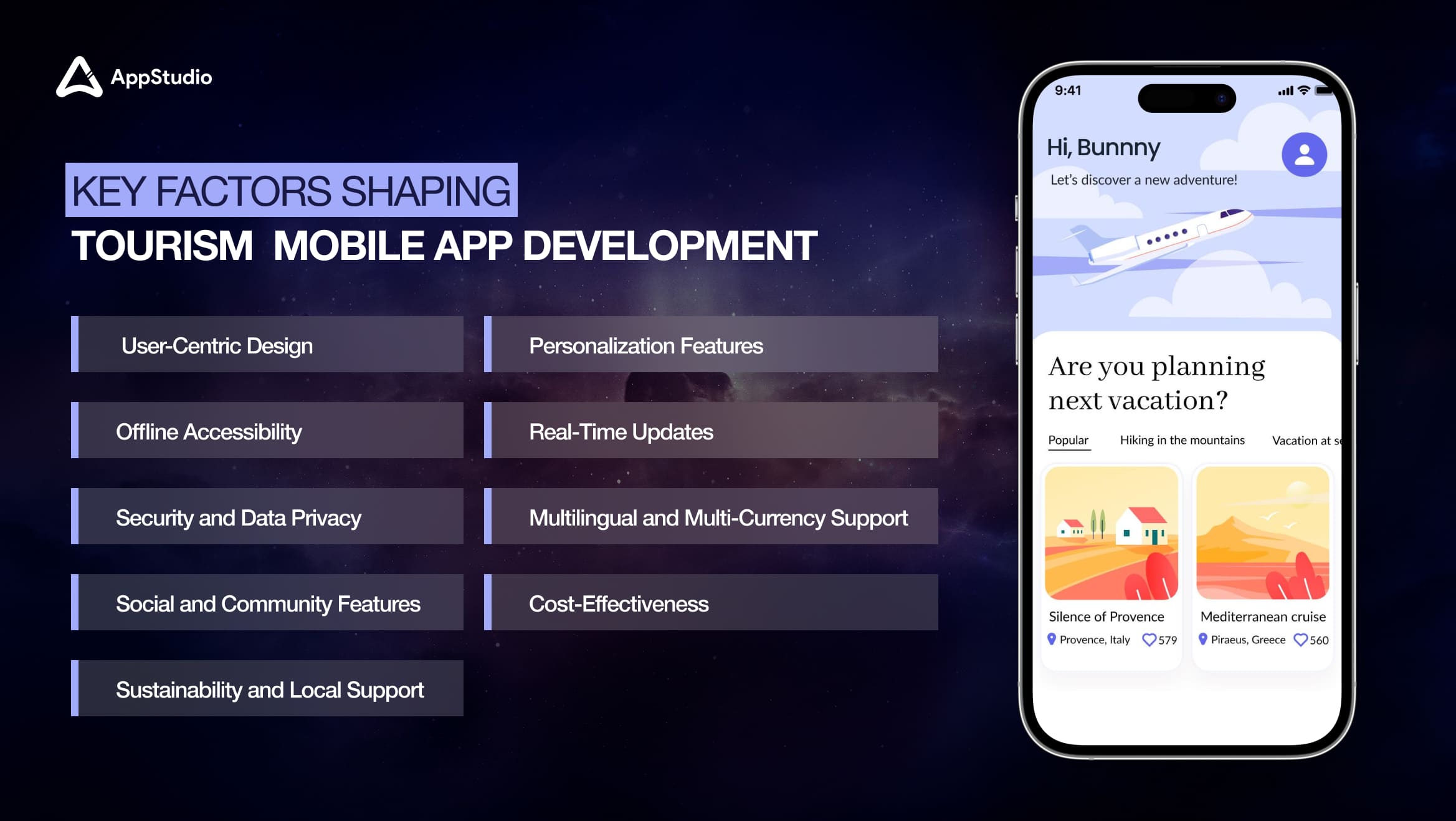
With modern travelers changing requirements and key trends evolving every quarter, mobile apps have become essential tools for the travel and tourism industry. Here are the key factors that influence the development of successful tourism apps:
1. User-Centric Design
A seamless and intuitive interface attracts users by making its interface simple and enjoyable. Modern travelers expect apps to anticipate their needs, offering innovative designs that adapt to evolving user behaviors and expectations.
2. Personalization Features
AI and ML enable customized recommendations, tailoring travel experiences to user preferences. Future-focused personalization goes beyond itineraries, suggesting unique local experiences and eco-conscious options.
3. Offline Accessibility
Apps with offline functionality allow users to access maps, guides, and emergency contacts even in areas with no internet. This feature ensures inclusivity for travelers exploring remote areas or eco-destinations where connectivity may be challenging.
4. Real-Time Updates
Live updates on weather, safety alerts, and transport schedules keep users informed and adaptable. Incorporating predictive analytics can further enhance planning by alerting users about potential delays or disruptions in advance.
5. Security and Data Privacy
Robust security protocols ensure the safety of sensitive user data, such as payment details and location, building trust in the app’s reliability. Advanced encryption and biometric authentication are critical for addressing modern security concerns.
6. Multilingual and Multi-Currency Support
Travelers can book and explore effortlessly with language translation and multi-currency payment options. AI-powered translation tools and region-specific payment gateways provide a truly global experience for users.
7. Social and Community Features
Social sharing and community-driven networks allow users to connect with others, gain insights, and share experiences. Interactive forums and real-time travel groups help build a connected travel ecosystem.
8. Cost-Effectiveness
Transparent pricing, deals, and discounts cater to budget-conscious travelers, making the app more appealing and accessible. Integrating AI to predict cost-saving opportunities further enhances value for users.
9. Sustainability and Local Support
By promoting eco-friendly travel and supporting local businesses, apps can align with modern travelers’ values. Features such as carbon footprint trackers and partnerships with local eco-tours position apps as forward-thinking and socially responsible.
Related reading: How to Plan Mobile App Development Project
3 Ways to Build User Engagement in Travel Mobile Apps
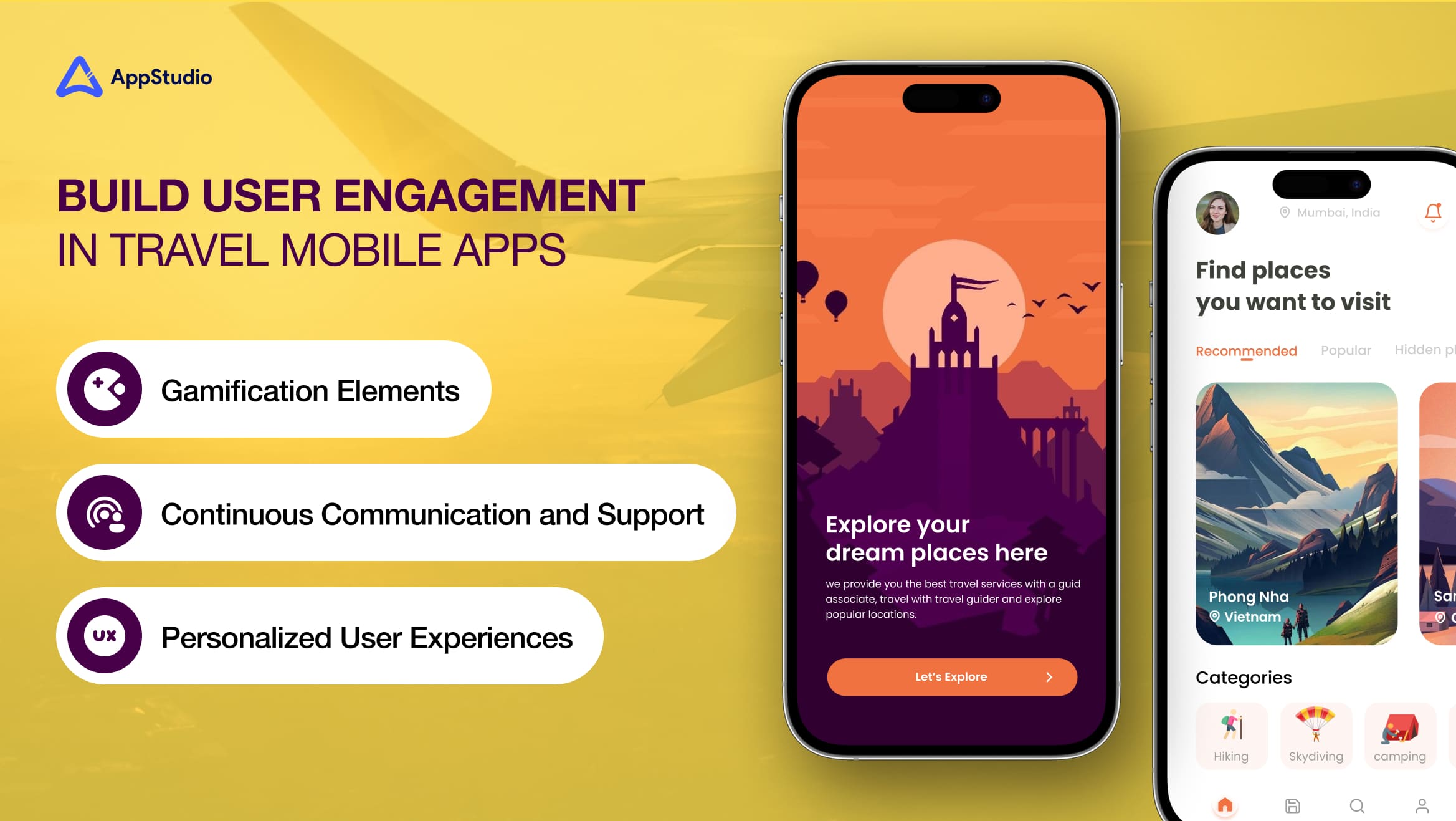
As travel apps redefine convenience and experiences, keeping users engaged becomes the next essential goal. Engagement isn’t just about retaining users—it’s about creating lasting value, inspiring trust, and encouraging repeat interactions. Let’s explore compelling travel mobile app features to enhance engagement.
1. Gamification Elements
Gamification brings fun and excitement into travel planning, turning the process into an interactive experience. Features like reward systems, challenges, and leaderboards motivate users to explore app functionalities and stay engaged.
For example, travelers can earn points for completing bookings, writing reviews, or sharing experiences on social media. These points can be redeemed for discounts, exclusive offers, or loyalty perks.
2. Continuous Communication and Support
Maintaining constant and meaningful communication throughout the user journey is key to engagement. Real-time notifications inform users about flight updates, hotel check-ins, weather changes, or safety alerts, ensuring a stress-free experience. In addition, integrating in-app customer support through live chat, chatbots, or help centers empowers users to seek assistance anytime.
For example, a chatbot can instantly resolve queries about cancellations, itineraries, or local tips, building trust and reliability.
3. Personalized User Experiences
Personalization is at the heart of effective user engagement. By analyzing user behavior, preferences, and search history, travel apps can provide tailored content that feels relevant and meaningful.
For example, if a user frequently browses beach destinations, the app can send notifications about exclusive deals for coastal getaways or suggest customized itineraries.
Additionally, personalized onboarding experiences that highlight features of tourism app relevant to each user ensure a smooth start.
Future Trends in Travel App Features: What’s Next?
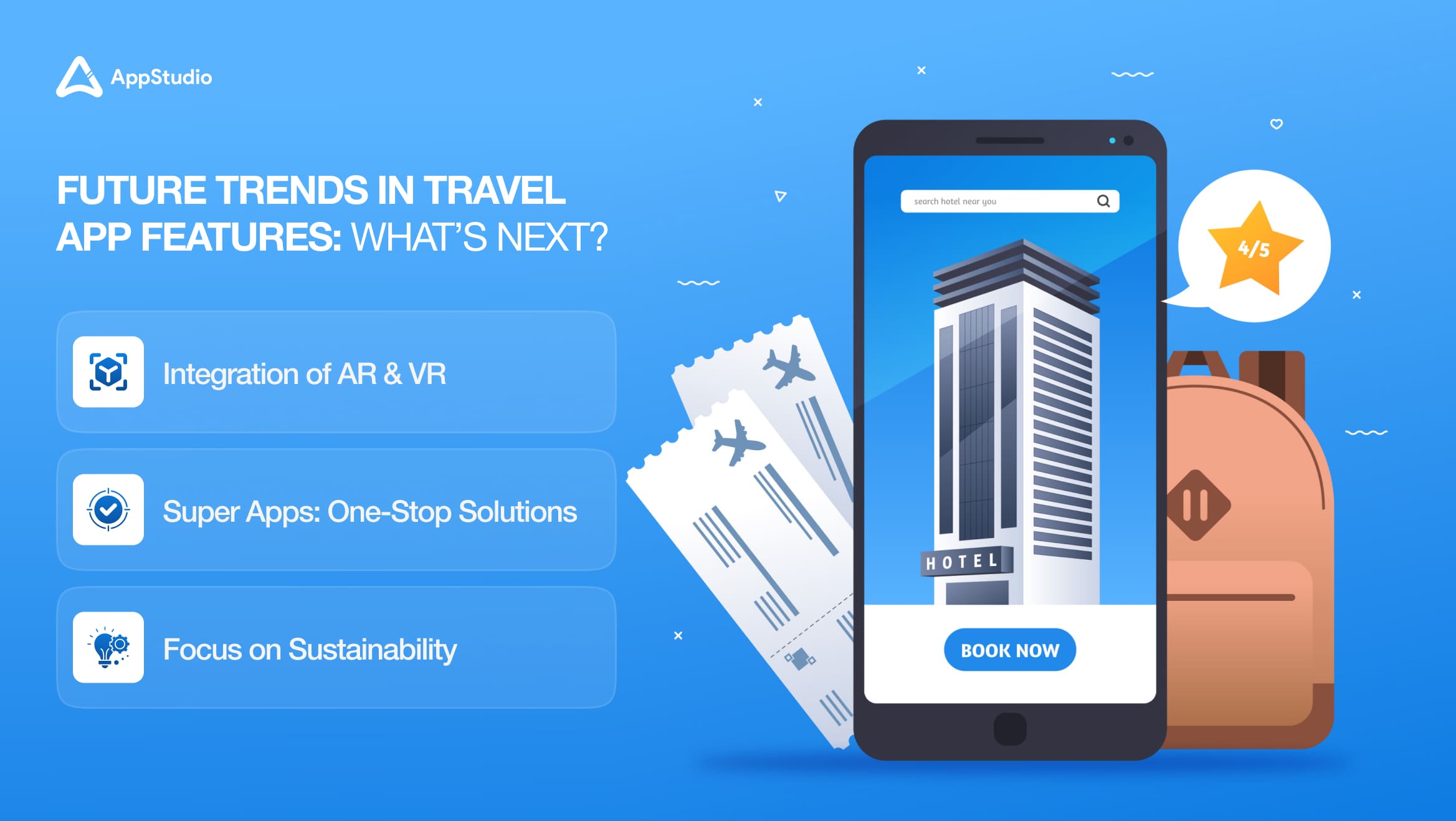
The growing demand for more thoughtful, immersive, and eco-conscious experiences is driving advancements set to shape the future of travel. This shift is reflected in the market’s growth trajectory, wherein the global travel app market is expected to reach $242.4 billion by 2030, highlighting its growing importance. Below are some intelligent travel app features that are bound to shape the future of travel.
1. Integration of AR & VR
Augmented Reality and Virtual Reality are set to revolutionize how travelers explore destinations. AR enhances real-world environments by directly overlaying useful information—such as navigation details, restaurant reviews, or historical facts—on a traveler’s device. Meanwhile, VR provides immersive, 360-degree previews of hotels, tourist attractions, and local experiences, allowing travelers to “visit” locations virtually before making any decisions.
With these features of the tourism app, travelers can plan more confidently and enjoy a richer experience, bridging the gap between expectation and reality. Whether exploring landmarks through AR or taking a virtual resort tour, these tools will ensure smarter, well-informed choices.
2. Super Apps: One-Stop Solutions
Super apps are emerging as a game-changing trend, offering travelers everything they need in a single platform. From booking flights and accommodations to managing itineraries, dining reservations, and secure payments, these apps combine multiple services into a cohesive experience.
This travel app feature eliminates the need to juggle multiple platforms, simplifying trip planning and execution. Super apps deliver unmatched convenience, saving time while streamlining every aspect of travel logistics.
3. Focus on Sustainability
Sustainability is at the forefront of future travel trends, and travel apps adapt to meet this growing demand. Features like eco-friendly accommodation searches, flight carbon footprint tracking, and curated recommendations for local, sustainable activities are becoming mainstream. These tools help travelers make environmentally conscious choices without compromising on experience or comfort.
Related reading: What are The Primary Steps in Developing A Mobile Application?
Wrapping Up!
As the travel industry evolves, advanced travel app features are no longer optional—they are essential tools for enhancing safety, convenience, and user experience.
At AppStudio, we specialize in building cutting-edge travel applications loaded with new-age features of tourism app tailored to meet the needs of today’s globetrotters. Our expert team integrates advanced technologies like IoT, AI-driven risk assessment, and secure payment gateways to deliver robust, scalable solutions. Whether you’re looking to create a comprehensive travel booking platform or a niche tourism app, we’re here to guide you through every stage—from concept to deployment.Ready to redefine your travel app vision? Book a free consultation with AppStudio today, and let us help you design a solution that delivers real value!
Frequently Asked Questions
Travel app features have evolved to prioritize safety and ease of use. Innovations like real-time location tracking, emergency SOS alerts, contactless payments, and health safety notifications now address traveler concerns, making journeys safer and more seamless.
AI powers modern travel apps by analyzing user preferences and behavior to offer personalized suggestions. From tailored itineraries to accommodation and activity recommendations, AI enhances decision-making and creates more intuitive, user-centric travel experiences.
Travel apps enhance safety with tools like real-time alerts for health and security risks, offline maps, local emergency contact directories, and location-sharing options. These features empower travelers to navigate confidently and respond effectively to unforeseen challenges.
Essential travel app features include real-time location sharing, emergency assistance options, offline access to maps and itineraries, personalized suggestions, and secure payment gateways. These features ensure safety, convenience, and an overall improved travel experience.
AppStudio delivers cutting-edge travel app solutions with advanced features of travel apps, including AI-driven personalization, seamless booking processes, real-time safety tools, and intuitive designs. With a focus on user engagement and innovation, AppStudio builds solutions that set businesses apart in the travel technology market.
